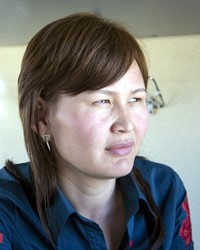Kazakh in Iran

Photo Source:
Petar Milošević - Wikimedia
Creative Commons
|
Send Joshua Project a map of this people group.
|
| People Name: | Kazakh |
| Country: | Iran |
| 10/40 Window: | Yes |
| Population: | 7,000 |
| World Population: | 17,966,900 |
| Primary Language: | Kazakh |
| Primary Religion: | Islam |
| Christian Adherents: | 0.00 % |
| Evangelicals: | 0.00 % |
| Scripture: | Complete Bible |
| Ministry Resources: | Yes |
| Jesus Film: | Yes |
| Audio Recordings: | Yes |
| People Cluster: | Kazakh |
| Affinity Bloc: | Turkic Peoples |
| Progress Level: |
|
Introduction / History
The Kazaks are originally semi nomadic, equestrian tribal people who roamed the Ural Mountains and the regions of northern and Central Asia of Eurasia. Several of their clans formed a federation for mutual protection, thereby establishing an ethnic identity of their own. Kazakh ethnic identity accelerated during the late 15th and early 16th centuries. During the late 19th and early 20th centuries, as the annexation of Central Asia by Russia and the Soviet Union progressed, many Kazakhs fled the steppes to many countries including Iran. Since 1929, ethnic Kazakhs have been trickling into Iran due to political instability at different times in history. Many of them became refugees in Iran. Iran also bought Kazakhs as slaves from slave traders. Those that migrated are settled mostly in the Golestan and Gorgan Provinces in northern Iran. Today, the prospect of economic prosperity serves as a main reason for such emigration.
What Are Their Lives Like?
For over more than 80 years, the diaspora Kazakhs of Iran have kept their culture and traditions – even the way they dress – and their religion. Iranian Kazakhs today are accomplished farmers, well-known for their beautiful handicrafts. They tend to marry among their own ethnicity. In their earlier days as nomads, tribalism formed the basis of their society. In the modern world, tribalism is slowly fading in everyday life. Nonetheless, when ethnic Kazakhs first meet one another they tend to ask about the tribe or clan they belong to. The Iranian Kazakhs speak both Persian and Kazakh at varying levels. The cultural, social and religious commonalities have caused prevalence of common terms and there exists about 6,000 common words between both Kazakh and the Persian language. Owing to the intertwining of their culture with the Iranians, many aspects of their lives have great similarities. One such event is the Nouruz (New Year) Feast, celebrated throughout the land of Iran. The ceremony of house cleaning, wearing new clothes and visiting various relatives before Norouz is a few of the common customs the Iranian Kazakhs have adapted to the land of their living. The outfit of the Kazakhs is usually a white cloth as a symbol of happiness. In addition to their traditional cuisine, during New Year, Kazakhs also serve the Iranian "Norouz Gujeh," a green bean noodle soup. Aside from Nouruz, the Iranian Kazakhs also observe the traditions of the religious feast - Eid-Al-Adha, circumcision, betrothal and wedding, funerals, reciting Fateha Sura and alms giving, and the yearly anniversary for the dead. No matter where they live, the Kazakhs enjoy their traditional cuisine. They begin their day with a cup of black tea. Besbarmak is a traditional Kazakh food made with lamb. Rice and bread are common staples. The Kazakhs enjoy eating apples, grapes, melons, and tomatoes and drinking fermented horse milk. Those who practice Islam do not drink alcohol. Kazakhs extend great hospitality and are open to external influences. They consider it an offence to decline an invitation to dine at their homes. Their social occasions are marked with lavish feasts and singing in groups. The dombra and kobyz, two of their traditional musical instruments, are popular among Kazakhs. Kukpar is a popular sport played by Iranian Kazakhs, where a goat carcass is moved to a goal by horse-riders. The structure of the Kazakh family is patriarchal, but this is gradually changing. Such changes have caused a breakdown in the traditional Kazakh family. However, Kazakhs still retain an extremely hierarchical view and people of age and high position are given great respect and honor.
What Are Their Beliefs?
The Kazakhs are Sunni Muslims, and they live peacefully with the Shia Muslim Persian neighbors. The acceptance of Islam led to many religious terms entering into the Kazakh language via Persian concepts. Some of those words include God, prophet, imam, prayer and fasting, ablution, marriage, religion and belief, brother, school, paradise and hell, angel, and king etc. Some of their Islamic practices are combined with traditional folk religions such as shamanism, animism and ancestor worship. Many Kazakhs continue to consult shamans (priests who communicate with the spirits). Many of them wear protection beads and talisman to ward off the evil spirits and the evil eye. Pregnant Kazakh women never venture out of the house for fear of jinn and fairies, a custom very popular with some Iranian tribes as well. The birth of a male child and the circumcision ceremony are highly regarded and celebrated.
What Are Their Needs?
As far as we know there is no Kazakh Church in Iran. Hopefully they can hear and respond to the gospel from Iranian believers.
Prayer Points
Ask the Holy Spirit to open the hearts of Kazakhs so that they will be receptive to the gospel. Pray for "Open Doors" as they build their ministry presence online for fellowship and discipleship to reach believers in isolation, and for their multimedia productions to reach the unreached. Pray for a growing house church movement and for the training and equipping of house church leaders. Pray for Open Doors and the Voice of the Martyrs as they conduct advocacy efforts and strive to meet the needs of Central Asian believers when they are imprisoned, excluded from families and communities, and deprived of employment because of their faith.